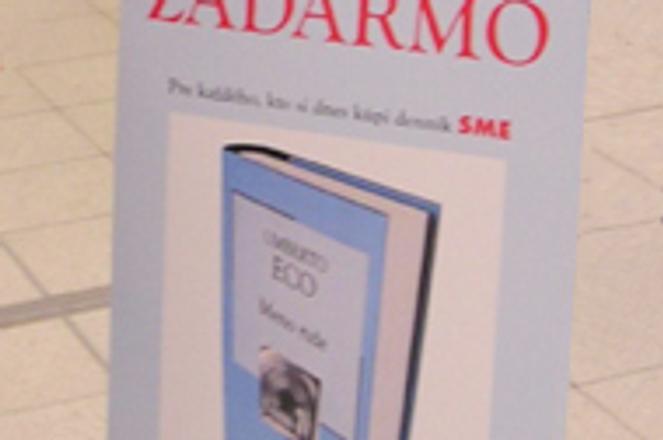A WELL-READ society is a better society.photo: Peter Župa
PEOPLE who bought a copy of the daily SME at news-stands October 18 received a precious and improbable free gift: a hardcover Slovak translation of Umberto Eco's 1980 intellectual thriller, The Name of the Rose.
The unusual giveaway - some 150,000 volumes were handed out, causing lineups at many news-stands - launched the daily's Svetová knižnica (World Library) programme, which plans to sell 40 classics of 20th century literature over the next nine months to Slovak readers more cheaply than in bookstores. The books will retail for Sk185 (€4.50) a copy.
Alexej Fulmek, director of SME publisher Petit Press, said he expected the combination of price and placement (the books will be sold from Slovakia's 6,500 news-stands) to yield sales of more than one million volumes, or 25,000 to 30,000 per title.
If successful, he said, the book drive would once again "create space in society for literature" and reverse the steep decline in book sales since 1989.
"Fifteen to twenty years ago, books tended to have print runs of 20,000 to 30,000 copies, and basically didn't sell less than 10,000 copies," Fulmek said.
"Nowadays it's normal for books to sell from 1,000 to 3,000 copies. These reduced sales are due partly to the fact that life has become faster, partly to the fact that new companies started printing these world classics, and also because books are now much more expensive."
The World Library list includes Kurt Vonnegut's Slaughterhouse Five, Henry Miller's Sexus, Albert Camus' The Stranger, and Ian McEwan's The Cement Garden.
"I'm sure that through this programme we'll show that a latent interest in books still exists in this country, and that more than 1,000 to 3,000 people are interested in books," Fulmek said.
"If that were true, it would be a tragedy."
Slovakia's World Library programme follows a path blazed by similar drives in other European countries, including Germany (8 million books sold), Montenegro (2 million) and Italy (55 million). In each country the author of the project, the Spanish firm Mediasat, has twinned with a major daily paper to promote and distribute the titles. In England, for example, it was The Daily Mail, in Spain El Pais.
"Daily newspapers act as trusted advisors to their readers," said Mediasat's director of development, Stefano Bovoli. "People don't always have the time and the culture to choose from hundreds of quality titles from the past, and the dailies confer a stamp of credibility on the books they promote. In turn, the dailies strengthen their image."
For Petit Press, the project is an expensive image builder. The book giveaway and marketing campaign, Fulmek said, cost the publishing house Sk15 million (€372,653) but was essential if newspaper readers were to become book buyers overnight.
"It was important to put the product in people's hands so they could see that we're not trying to rip them off, that it's not some piece of garbage but a really good book," he said.
The initial investment was also justified by the potential yield of the programme for its backers, he added.
"If we actually manage to sell a million books, the project will turn a very handsome profit; if we don't, then it's bad luck for us. The projected profit would in turn allow us to finance and publish a monthly 16-page literary supplement with a print-run of 120,000 copies, to work with young authors, do a profile of the Slovak literary scene, and so on."
Fulmek said the key to the project was distribution through news-stands.
"Whereas bookstores in Slovakia may number in the hundreds, there are maybe ten times as many newspaper points of sale, which makes the books more available. This is the genius of the project.
"The second point is that if you can raise mass interest, you can reduce the overall price, and because the books are printed at select printing houses, you can also reduce printing costs, meaning you can sell quality literature for very attractive prices."
For SME editor Milan Šimečka, the strategy also promised to raise the tone of public life in Slovakia after four decades of communism, whose leaders "banned books because they feared good literature", and where 15 years of rising prices have made books steadily less affordable.
"This is perhaps a self-serving project in that the more people read good literature, the more cultivated they are, the more resistant to manipulation and nonsense, and thus the better the society we live in," he said.
Bovoli, on the other hand, sounded a more prosaic note. "This isn't about getting people to read books, it's about getting them to buy books," he said.
"The first step is to get them to buy a book and keep it on the living room table. Then comes the reading part."



